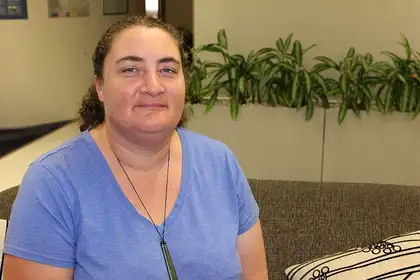
Belinda Borell, from Massey University’s SHORE and Whāriki Research Centre, has been granted more than $350,000 from the Health Research Council of New Zealand.
A Massey University academic and two students have been awarded funding from the Health Research Council of New Zealand, for three separate projects.
Belinda Borell, of Ngāti Ranginui, Ngāi Te Rangi and Whakatōhea, has been awarded more than $350,000 for her study entitled Privilege and health inequity: the role for Mātauranga Māori.
Ms Borell has been awarded the Hohua Tutengaehe Postdoctoral Fellowship to examine how societal attitudes and representations may affect the everyday workings of health systems, institutions and professionals. She is particularly interested in what role privilege plays in the interactions between patients and professionals and how this may affect health inequities amongst different ethnic groups.
“I feel very honoured to have been awarded this fellowship," she says. "Hohua Tutengaehe was an important leader in Māori health and social wellbeing. I hope to pay tribute to his legacy by expanding the role and application of Mātauranga Māori. We know that attitudes and subjective opinion have an impact on health experience, both positive and negative. I am interested in examining how this may work in the New Zealand context and how we may reduce health inequities as a result.”
Ms Borell, a researcher at Massey’s SHORE (Social and Health Outcomes Research and Evaluation) and Whāriki Research Centre, is one of 17 Māori career development grant recipients, announced in the latest funding round from the council.
Māori Health Research Masters Scholarship
Master of Arts student Nari Hann, who is majoring in Psychology, has received the Māori Health Research Masters Scholarship of $25,000 for her project entitled Foster caregiving relationship with newborns who have feeding difficulties.
The intention of her study is to expand on foster care research by looking at the caregiving relationship with newborns who have difficulties feeding. “This study is a contemporary topic in New Zealand due to the high number of children placed in foster care every year, and the commonality of placement breakdowns. Placement breakdowns are a major contributory factor in the development of adverse outcomes experienced by this group of children throughout their lifespan.
“Many newborns who enter foster care experience complications, such as feeding difficulties. Problematic feeding times have been identified as influencing the caregiver-child interaction and consequently, many of the placements break down because of the difficulties experienced by caregivers during feeding, culminating in the child being passed around multiple homes. The aim of my research is to understand the experiences of caregivers when feeding newborn babies in foster care with feeding difficulties,” Mrs Hann says.
Pacific Health Research PhD Scholarship
The HRC granted $125,000 to Master of Science student Veisinia Pulu-Lakai, who is majoring in Health Psychology. Her grant, from the Pacific Health Research PhD Scholarship fund, is for her project entitled Co-designing a community-based intervention programme for prediabetes. Mrs Pulu-Lakai’s grant is one of 26 Pacific health research career development awards for 2018.
Her study will examine Pacific Tongan youth understandings of prediabetes and its risk factors to reduce the prevalence of prediabetes by empowering Pacific communities using collective action to lead healthier lives. The specific objectives of her research are to:
- Examine Pacific Tongan youths’ perceptions and understanding of prediabetes and its risks on health and wellbeing, including identifying the barriers of access to lifestyle management programmes.
- Develop a community-based intervention programme aimed at reducing the risk for prediabetes using community-based participatory action research and co-design methods.
- Evaluate the effectiveness of the intervention programme on outcomes associated with risk reduction of prediabetes.
The council received 46 applications for the 2018 Pacific health research career development awards – an increase from 29 last year, demonstrating a growing interest in, and need for, health research addressing the needs of Pacific people.
Māori Health Research Postdoctoral Fellowship
Belinda Borell - Hohua Tutengaehe fellowship
Privilege and health inequity: the role for Mātauranga Māori
36 months
$354,204
Māori Health Research Masters Scholarship
Nari Hann
The foster caregiving relationship with newborns who have feeding difficulties
12 months
$25,053
Pacific Health Research PhD Scholarship
Veisinia Pulu-Lakai
Co-designing a community-based intervention programme for prediabetes
36 months
$125,790